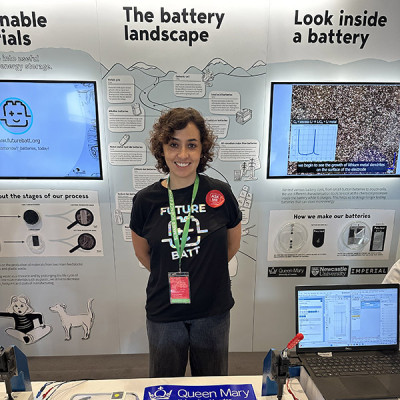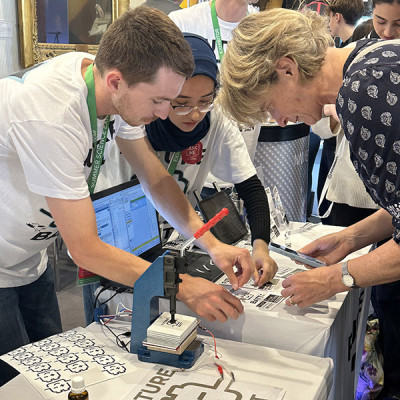News
Queen Mary-led project impresses at Royal Society Summer Science Exhibition
12 July 2024


Dr Maria Crespo-Ribadeneyra, along with PhD students from Queen Mary and academics from Imperial College London and Newcastle University, led a week-long series of hands-on activities and demonstrations at the Royal Society’s Summer Science Exhibition.
Their project, 'Future Batt', is focused on finding ways to make batteries more sustainable. The exhibition stand highlighted the environmental and financial challenges of current lithium-ion batteries, which rely on materials sourced from around the world—often at great ecological cost and with ties to conflicts and human exploitation.
“We use many critical materials in lithium-ion batteries, such as lithium, cobalt, and nickel, which come from politically compromised countries. Therefore, there is significant room for improving the sustainability of these batteries,” Dr Crespo-Ribadeneyra told the BBC World Service.
The Future Batt team is exploring the use of biomass and plastic waste to create batteries, extending the lifecycle of these materials and reducing the carbon footprint of battery production. They are also learning lessons from the limitations of lithium-ion technology, to design future batteries that are easier to recycle.
Visitors to the exhibition included school groups, grandparents and grandchildren, other scientists and local passers-by. They each had the opportunity to make their own batteries using molecules derived from plants and food — including blueberries! Attendees were also invited to build simple circuits which they were able to take home on a lanyard.
Dr Crespo-Ribadeneyra was interviewed by the BBC World Service for their "Science in Action" programme, where she explained why sodium-ion batteries are likely to play a key role in the future of energy storage. “In China, they’ve already demonstrated cars powered by sodium-ion batteries. We believe diversifying the energy storage landscape is essential, as relying on just one type of battery isn’t ideal. Sodium-ion batteries are an alternative, not a competitor,” she said.
You can listen to the full interview on BBC Sounds – with Future Batt featured around eight minutes into the programme.
Take a look at the video of our visit below.
| Contact: | Maria Crespo-Ribadeneyra |
| Email: | m.ribadeneyra@qmul.ac.uk |
| Website: | |
| People: | Maria CRESPO-RIBADENEYRA |




